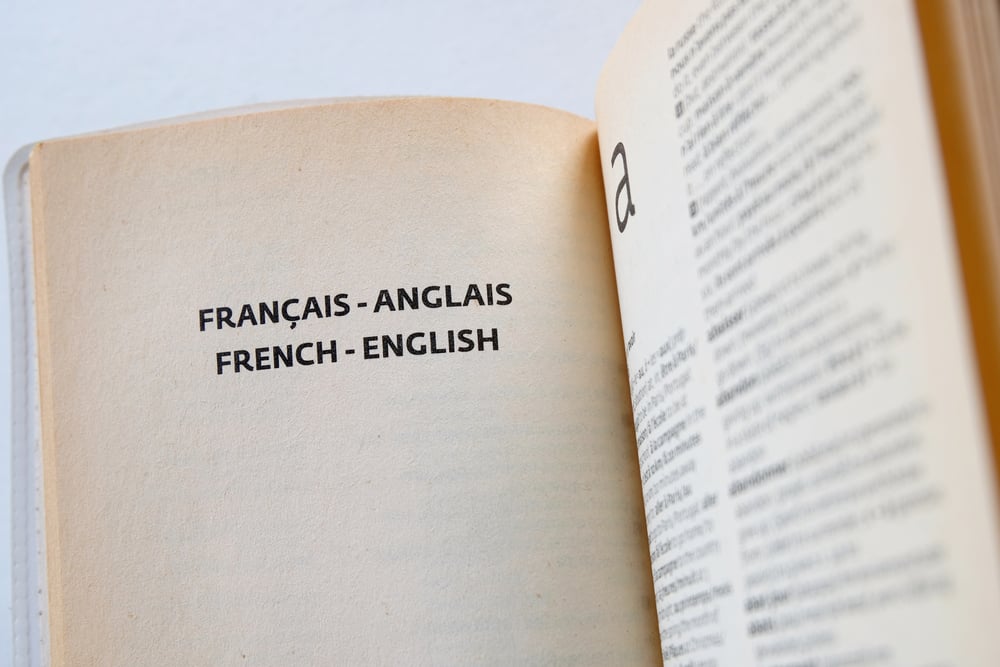If you are reading this article in English, you are most likely interested in moving to France (on a Working Holiday Visa or otherwise). Moving anywhere can be daunting, but especially when you’re not a native speaker of that place’s language. So how much French do you really need to know for life in France?
This is an oft-asked question but one that isn’t answered to great detail because it is complicated; life abroad consists of countless different contexts, each of which requires its own level of fluency. Let’s explore the most important situations and see how much French each one requires.
First and foremost, know that the Working Holiday Visa to France has no formal language requirements.
Learn how to apply.
1. Finding a place to rent
Obviously, short term accommodations without leases such as Airbnbs, hotels, and hostels have no language requirement, so we’ll skip straight to discussing rentals.
The biggest challenge for finding a rental is not necessarily language, but rather that when you first arrive in France, you are likely to not have a job or a local guarantor yet. You might not have a euro bank account or a local phone number yet either.
Once you get those administrative things in order, you can consult:
- Facebook groups. There are English ones, just search keywords like “France housing”.
- Housing websites (some listings are written in English). Examples include lacartedescolocs.com and leboncoin.
- Agencies. Some may even specialize in helping expats.
In competitive markets, it’s somewhat of a numbers game, so message any listings that look promising and use a translation tool in written communication if necessary. Check out our article on How to Find Housing During Your Working Holiday Adventure in France.
- Verdict: Basic to intermediate French would facilitate written communication with landlords and agencies, but it is not impossible without.
2. Finding a job
If you don’t speak at least intermediate French, then unfortunately job options will be limited. The service sector (e.g., restaurants, bakeries, hotels) recruits heavily, however those jobs require frequent interaction with locals, and so fluency is a must in most cases. Typical office work also will require French, if not for clients then at least for communication between colleagues.
Opportunities that are more amenable to foreigners include jobs in tourism, language education, freelance writing (in your language), au pairing or childcare, and manual labor (e.g., on farms, vineyards, housekeeping). On the skilled end of the spectrum, there are multinational companies with offices in Paris that might have more relaxed requirements for French if their working language is English, but those have comparatively stringent educational and experience requirements. Examples of these include multinational banks, tech companies, marketing firms, and management consultancies.
Candidates should apply in the language that the job posting is written in. Check out our Complete guide on how to find and start a job in France.
- Verdict: Jobs exist for non-French speakers but options are limited. You may have to look outside of your desired field.
3. Making friends
It depends on where you are in France. In Paris, there are countless expat groups on Meetup and Facebook. Other cities have significantly fewer expats, but certainly not zero. It also depends on your lifestyle. If you plan to be living a nomadic life on your working holiday, then friendships may be harder to deepen and maintain.
Without speaking fluent French, it will be very difficult to make local French friends. Or if you do, they will most likely exclusively speak to you in English. Unfortunately, not many people have the interest or patience to slow down and simplify their speech in the context of making friends. This might seem mean, but it’s nothing specific to France. If you think about it, when was the last time you took the effort to nurture a friendship with someone who doesn’t speak your language natively or at least fluently? Communication is foundational to connections.
- Verdict: In big cities there are plenty of friends to be made, but they will likely be expats, or locals who are keen to practice English.
4. Interacting with the government
During your stay you might have to interact with the state for administrative things such as renewing your visa, requesting a social security number, and filing taxes. In the context of a working holiday, most of these are only relevant to Canadian citizens, who are authorized to extend their stay by an additional 12 months via an autorisation provisoire de séjour.
These interactions with the government require advanced knowledge of French. Terms are complicated and government employees are notoriously reluctant to provide service in English. Even for locals, dealing with administration can be a dreadfully stressful experience. If you are not confident in your language skills, it will be important to solicit the help of a trusted French-speaking friend.
- Verdict: Fluency in French is required; don’t expect any government service to be provided in English.
5. Opening a bank account and phone line
The process of getting a French number is quite simple. For some operators like Free Mobile, it can be done entirely online within minutes thanks to e-SIM offerings. However, the websites of most telecom operators are usually entirely in French, so you can try using your browser’s translation function. If that doesn’t work, then there’s always the manual solution of copying and pasting sentences into a translation tool.
There are two ways to get an account and card in euros. The first is via a neo-bank such as Wise. Account creation can be done fully online, from France or your home country. In addition to euros, a single Wise account can hold over 40 currencies, which makes it a practical option for globe trotters.
If you expect to need to write or deposit cheques, you may want a traditional bank account as well. Traditional banks require an in-person visit to the local branch for account creation. Employees at such financial institutions are usually friendly and willing to serve English-speaking clients. Go in person to ask what documents you need to bring and they’ll likely set up an appointment for you with someone who can help you in English.
- Verdict: Little to no French is required.
6. Travel and transportation
France is among the most visited countries in the world and so its public transportation system is quite well adapted to use by foreigners. Municipal transportation schedules and routes are integrated into apps such as Google Maps and Citymapper, and national high speed rail is on SNCF Connect (see our article on The top 10 apps to download when living in France). Since all of their apps are available in English, you should have no problem getting around and to other cities. Airport signage is also fully bilingual.
- Verdict: No French is required to get around France if you’re familiar with mobility apps.
7. Arts and culture
Most of the beauty that France offers transcends language and can be appreciated by just about anyone. But there are some examples of experiences that require a very high level of French fluency. Those include the following: watching a French film at the cinema, a stage play, a comédie musicale, or French standup.
There are also a couple of examples of experiences that require beginner to intermediate fluency, such as various festivals and salons (fairs based on various themes). You can still attend and have a great time, even if you don’t understand all the signs and announcements around you. Lastly, keep in mind that smaller or independent museums might only have plaques in French next to their pieces.
- Verdict: With a few exceptions, France’s art and culture are accessible to all.
8. Dining out
Millions of tourists visit France every year, so obviously it is possible to eat out without knowing French. But if you want to practice sounding like a local, check out Eating out in France: How to reserve, order, and ask for the bill like a local.
- Verdict: No French is required.
Conclusion
If you’re adventurous and brave enough to move to another country, then you likely already possess the adaptability to survive, regardless of your language proficiency. France has received many foreigners before you, and most of them have managed just fine, so don’t let language be the one reason that stops you.
While fluency may not be required to survive, getting to even an intermediate level can make life easier. With every little improvement, you unlock new experiences and friendships that would be otherwise inaccessible in English. And lastly, keep in mind that learning someone else’s language is the ultimate sign of respect and humility, so every effort counts, even if it sometimes doesn’t feel that way.












 Français
Français English
English




(1) Comment
I’m encouraged by Jackson’s article: don’t let language be the one reason that stops you!
{{like.username}}
Loading...
Load more